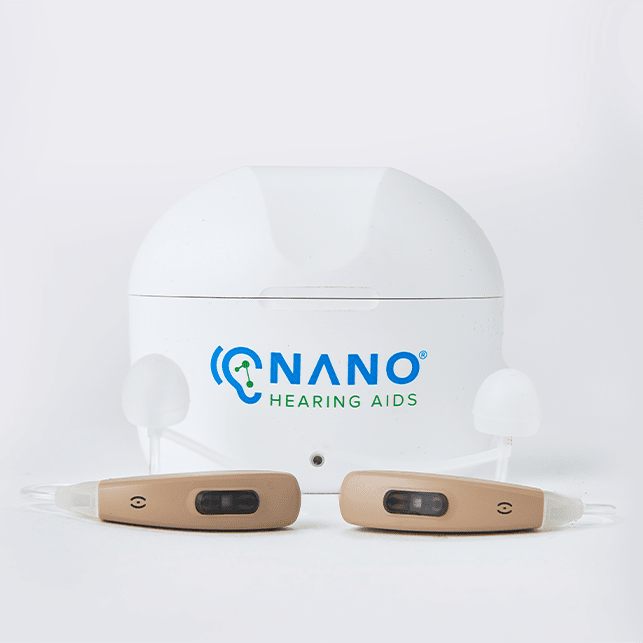Hearing loss takes away one’s ability to hear and take part in conversations. Hearing aids can help in solving this problem. However, conventional hearing aids may not be ideal for listening to music.
Music has a wide dynamic range. The pitch and volume can drastically change. While speech sounds range between 30-90 dB, live music sounds can exceed as high as 120 dB. Therefore, hearing aids need a larger range to listen to music.
In this article, we will talk about how to listen to music with hearing aids. Here, we will discuss hearing aids good for listening to music, assistive devices, applications, hearing aid settings, and what to look for when buying hearing aids.
How to Listen to Music with Hearing Aids
There are a few measures you can take to elevate your music experience through hearing aids. Take a look at them and choose the best option for you:

Hearing Aids

If you are a music lover, make sure to let your audiologist know beforehand. Thus, your audiologist can help you choose a hearing aid suitable for you. The new generation hearing aids enable the user to adjust it for listening to music.
While buying your hearing aid, make sure your hearing aid can be adjusted for the following:
Your audiologist can customize your hearing aid for listening to music. Most hearing aids now allow users to create separate profiles for different hearing situations. All the users need to do is switch profiles according to the situations they are in.
So, ask your audiologist to create a profile for listening to music. Then switch to the profile with remotes, buttons on your hearing aid, or smartphone app for hearing aids, and enjoy your favorite band.

Assistive Devices

If you already have a hearing aid, you can elevate your music experience with assistive devices. Most of these technologies use Bluetooth to connect. So, if you have a Bluetooth supporting hearing aid, you can easily connect these devices and get a better music experience.
These devices help you transform your hearing aids into wireless headsets. Here are some assistive devices to help you listen to music:

Headphones

Amplified headphones can help in sending music signals better than standard headphones. Also, you can use a headphone equalizer to adjust frequencies to suit your needs. Some also use noise-canceling headphones over hearing aids to listen to music well.

Loops

Hearing loops are excellent assistive devices for enjoying live music in concert halls. Hearing loops pick up wireless signals from mobile devices or cinema halls, theaters, churches with telecoil settings.

Remote Mic

This device is quite straightforward; you connect the mic to your hearing aid device and put it near the source for hearing better.

Streamers

Streamers are small devices that carry sound from other devices to your hearing aids wirelessly. One can receive sounds directly from television to their hearing aid with this device. Ask your audiologist to enable this streaming program on your hearing aid.
14 Tips to Enhance Listening to Music Experience through Hearing Aids
Suffering from hearing loss doesn’t have to mean you should stop listening to music. You can easily overcome that difficulty by taking some simple calculated measures. Here are some tips to enhance your music listening experience when using hearing aid devices.
Common Problems in Listening to Music with Hearing Aids
As we stated earlier, listening to music through conventional hearing aids can pose several problems. Here are the issues one might experience:
Background Noise
Hearing aids are developed to reduce background noise to help the users listen to sounds better. Although it helps the user while listening to conversations, this very thing creates problems while listening to music. The hearing aid algorithm may detect a low-frequency chord as background noise and block it. Therefore, the user cannot enjoy music to its fullest.
Low-Frequency Loss
In most cases, people tend to lose their ability to hear high-frequency sounds. Therefore, most hearing aids are focused on correcting that disability. As a result, hearing aids detect low-frequency sounds as noise and cancel them. It creates problems when listening to music.
Wide Dynamic Range Compression
Most conventional hearing aids are designed to boost softer sounds and compress wider-ranged ones. So, these hearing aids prevent the user from hearing different notes in a piece of music.
Reduce Feedback
Another significant problem with older hearing aids is they omit some sounds like whistles as feedback. While this feature comes in handy during conversations, it can cause problems while listening to music. One can completely miss a flute or an organ melody because of this feature.
Final Words
Hearing loss can be devastating for music lovers. It costs a considerable part of their identity, and conventional hearing aids cannot undo this condition completely. However, with better quality hearing aids and assistive devices, these problems can be minimized effectively.
So, here are the known measures to experience music better despite having hearing difficulties. Let us know which one works for you better.



